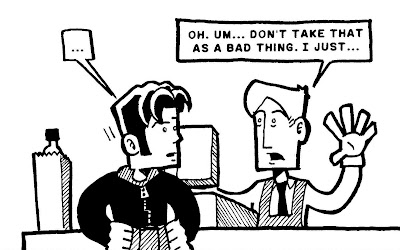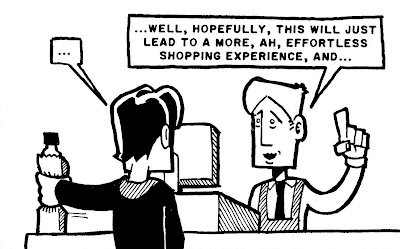I’m a guy who has always wanted to write for DC and Marvel. I know as a writer trying to get an indie book picked up by a publisher, I should be singing the praises of original concepts. Honestly, if
The Adventures of Wyatt Earp in 2999 got published and I could parlay that into a career writing my own stuff, but the Big Two wanted nothing to do with me, that would be totally cool. But the only reason I care about comics as an art form today is because I was introduced to it through superheroes as a kid, and I still read a modest number of superhero books every month.
As a lad, my ultimate goal in life was to one day write all my favorite superheroes. Around, oh, 1998 or so (when I would have been 14), I wrote a whole bunch of ideas down in a notebook. There’s a page for Fantastic Four, a page for the Hulk, one for Superman, and so on.
Some of these ideas are, of course, kind of dumb when you look back on them after ten years (there is a grim ‘n’ gritty Jay Garrick Flash idea floating around in there, of all things, and a highly unoriginal “Captain America’s life is systematically destroyed by a mysterious mastermind who turns out to be Bucky, but not really” story), but some of them I still think have the seeds of some pretty decent stories in them.
Some of them were so good, in fact, that DC and Marvel stole them from me. And by “stole,” I mean, of course, “had a somewhat similar idea completely independently from me, and it’s not like that idea was so radically original that ten other people could not have thought of it before.”
But dude, they totally stole my idea!
Here are some examples:
The Marvel Universe’s “Fifty-State Initiative”: The idea was that the government requests the Avengers spread themselves out across the United States and each take a major city, like the DC heroes do (for some reason, the notes are quite clear that Hawkeye takes Dallas and Darkhawk (?!) takes Seattle). Eventually, each Avenger was to become the centerpiece of a new team with all-new superheroes. There would have been one for each state, just like they’re doing in the real Marvel books, except the leaders would have met for council sessions presided over by Captain America in Washington, DC. It was going to be called Avengers Network, I guess because it would be a network of superheroes, and because “network” was a pretty cutting-edge phrase in the late ‘90s.
Peter Parker becomes a teacher at his old high school: J. Michael Straczynski used this just a few years later in his Amazing Spider-Man run. I originally thought it would have been a nice “full circle” kind of thing, with Peter going from nerdy high schooler to semi-cool science teacher, but when I saw it in practice I ended up missing the Daily Bugle too much.
Superman Beyond: I had a story that involved Superman teaming up with alternate versions of himself, just like the Final Crisis tie-in, but instead of trying to save the Multiverse, they were trying to save Hypertime (this was late ‘90s, remember, and that was supposed to be the Next Big Thing) from the Composite Superman (shut up shut up shut up the Composite Superman is totally rad you just don’t know).
 Superman “2” from All-Star Superman: I have been drawing this exact same symbol in school notebooks since the sixth grade. The only two explanations are that Grant Morrison invaded my thoughts as a pre-teen, or that he and I are psychic soul mates and we would totally be best friends forever if he only got to know me. One of the two.
Superman “2” from All-Star Superman: I have been drawing this exact same symbol in school notebooks since the sixth grade. The only two explanations are that Grant Morrison invaded my thoughts as a pre-teen, or that he and I are psychic soul mates and we would totally be best friends forever if he only got to know me. One of the two.
The ending to Fantastic Four: True Story: I haven’t read this, but I read a review of it (scroll down a bit), and the ending is exactly the same as the ending to the comic proposal Josh and I were working on before Wyatt.
“Old Man Logan”: I’m kind of leery of Mark Millar these days, but Josh assures me this is kind of cool, so I’ll guess I’ll pick it up when it’s out in trade. Like Millar’s story, my story was one in which the superheroes are all dead, and the supervillains have divided the earth up into territories. Except instead of Wolverine (who was dead, naturally) as protagonist, the main character was the Wizard from the Frightful Four, of all people. The story was based on the ‘80s crossover Acts of Vengeance, and posited that the villains’ plan of “Hey, let’s all switch archenemies” actually worked.
- Kingpin took over North America and became President Wilson Fisk, sharing power with the Red Skull. But the Skull betrayed and murdered Fisk and installed his own puppet president. He keeps order through his secret police force, the Sinister Sixty-Four, made up of mostly Spider-Man villains and B-list Avengers foes, led by the Green Goblin.
- The Wizard gathered up all the mad scientists and turned South America into a haven for science without limits. Basically, it was like giving Warren Ellis his own continent. The Mad Thinker and Doctor Octopus were his lieutenants.
- Doctor Doom got Europe and ran things pretty well as long as you pledged unwavering allegiance to him.
- Mandarin takes control of Asia. Not real clever, I guess.
- The villains gave Australia to Apocalypse as kind of an island preserve for his “survival of the fittest” experiments (Apocalypse was a huge deal when I was a kid, so I had to find something for him to do).
- Magneto got Africa, I suppose to keep up the whole mutant/race metaphor.
- Dissidents got put in Antarctica, where they probably froze or were eaten by a dinosaur in the Savage Land.
- Loki was just cool ruling Asgard.
This was all background for the main story in which a cosmic Galactus-type threatens to destroy the earth. The point was that supervillains never stop to think that if they killed all the superheroes, there would be no one to save the world from this sort of crisis, because supervillains do a pretty terrible job of working together as it turns out.
So what was the point of this post? Sighing over missed opportunities? Venting some bitterness? Not a chance. Hey, Marvel and DC: A bunch of ideas I had ten years ago have come to pass (sort of). Ergo, the ideas that I have today will be wildly successful in 2018. Hire me now and be ahead of the curve!















